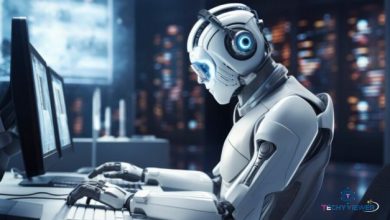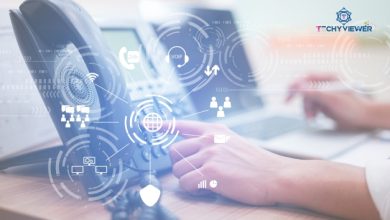Exploring AI in Education: Transforming the Learning Experience
Artificial Intelligence is a transformation of immense power that is influencing all domains of life, also education. It will transform how we teach and make it possible for us to provide people with more dynamic, better reflective, and more humane education that builds on creativity and inclusion rather than testing or limits.
And, on the verge of this revolution in education, everyone interested in the future of how knowledge is taught and spread needs to comprehend the force that artificial intelligence is and will become.
In this blog, you will explore the potential of AI in education both its amazing promises and numerous concerns and how it may be changing the learning experience as you know it.
What is artificial intelligence (AI)?
Artificial Intelligence, or AI, defines the phenomenon as a human-intelligence simulation process carried out by machines in computer systems, especially.
In less complicated terms, it refers to the usage of machines to perform tasks that would require human intelligence to be completed.
The Promise of AI in Education
AI technologies can help reduce administrative hassles. As such, educators can put more effort into their teaching rather than paperwork.
Overall, integrating AI into educational sectors would improve the effectiveness of teaching by far and the outcomes of learners.
Challenges and Opportunities
Despite the fact that AI in education is associated with many issues and obstacles, as with any disruptive technology, it opens up a plethora of opportunities.
Privacy, data equity, and the moral use of that information are just a few of the roadblocks hindering the realization of AI’s potential.
As varied as the challenges are, so are the possibilities—and a far-reaching vision of the future of artificial intelligence in education must strike a delicate balance.
Transforming Teaching Methods with AI
Personalized Learning
AI transforms teaching methods to suit your unique needs, competencies, and learning styles.
Artificial intelligence, through intelligent algorithms and data analysis, can customize pedagogical materials, learning speeds, or instruction methods so that you receive a comprehensive, meaningful, and memorable education that is as unique as you.
Adaptive Assessments
Furthermore, thanks to AI, there will be no more one-size-fits-all assessments and rather welcome adaptive assessments! AI will dynamically adjust questions and question difficulty based on your performance, assuring that you are neither overwhelmed nor bored during a test.
In this way, artificial intelligence provides you with the most accurate evaluations, and you and your teachers receive useful information in real-time.
Virtual Assistants
AI-powered virtual assistants are now your academic companions – your new virtual study pals! Virtual assistants employ the most advanced AI tools to instantly help you find the information you need or provide explanations and helpful study guidance.
Check Also: The Role of Pricing in Driving Business Growth: Lessons from Successful SaaS Companies
Augmented Learning Environments
Virtual Reality (VR) and Augmented Reality (AR)
The following is a hypothetical image: you would be able to attend lessons from the comfort of your own home while also visiting some of the planet’s earliest developed societies, slicing through virtual microorganisms, and conducting physics experiments.
When you use VR and AR to delve into the depths of a topic and work in a computer-generated simulation, learning is more immersive, interactive, and incomparably smoother than ever.
Gamification
Game-friendly activities like competitive scoring, obtaining a badge, and acquiring a sense of ability through an American weighted Index transform learning into a pleasurable challenge.
Learning math problems, a new language or history is more fun and effective when you’re enjoying the experience and eager to proceed.
Simulations and Modeling
Simulations may be used to research the conduct of atoms, learn about the climate, or master big systems. Being a dynamic atmosphere for experimentation and exploration, typically have no limitations.
By utilizing virtual labs and interactive models, you may have a more in-depth knowledge of complex ideas and enhance your problem-solving abilities without putting yourself at risk.
Enhancing Educational Accessibility and Inclusivity
Breaking Language Barriers
With the advent of diverse levels of translation technologies and priceless accessibility tools; it has become easier for people with different linguistic backgrounds or capabilities to access any learning material.
From the latest revolutions in language learning platforms to advanced AI-based translation services, speaking in a new language, or even learning one has become easier and accessible in itself.
Be it learning English as a second language, foreign literature in general, or just having a conversation using a foreign language with other peers of diverse cultural backgrounds, summoning the ultimate power of such a tool can indeed be used to drastically shorten the gap between education and education.
Addressing Learning Gaps
AI analytics and personalized learning platforms also help “target” individual learning gaps better than ever before.
Whether through the application of a learning disability that labours a certain subject or a desire to study at an advanced stage, this tandem gets you back with the resources and support necessary to help every student successful, through learning advancement and targeted reactions.
Ethical Use of AI in Education
The future of learning is being driven by technology and, as such, it is vital to concentrate on the ethical use of AI. Data privacy and data security, algorithmic bias and transparency, and many others are required to enable AI to positively expand education in an ethical and just manner.
Through maintaining these guiding principles and enhancing transparency across the development and use of artificial intelligence, you may put its abilities to work for you and benefit in equipping learners and teachers for success and protecting against potential dangers and downsides.
Future Trends
The future of education is a compelling prospect from practical learning to full immersion in virtual settings. Consider, for example, artificial intelligence (AI), virtual reality (VR) and augmented reality (AR) that are going to change how students are taught and trained as never before.
So, embrace these trends, and be open up to changes and you will not only thrive but survive in the quickly changing educational landscape.
Empowering Educators
As technology continues to revolutionize the educational sector, educators are significantly crucial in securing an ethical future and improving its transformative power in the classroom.
Given the necessary training, resources, and help to use AI and additional emerging technologies to their fullest extent, educators can be the inspiration of creativity, the catalyst behind critical thinking, and foster a lifelong passion for learning in every student.
Check Also: Free Artificial Intelligence-Powered Photoshop License
Conclusion
AI opens up a world of possibilities for education, but the ethical implications must be carefully considered, and the future must be prepared.
Through the proactive development and adherence to ethical guidelines and the appropriate training and support of educators, you can responsibly and equitably ensure that AI is an asset rather than a liability to education.
By collaborating and continuing to innovate, you stimulate a lifelong passion for learning, develop critical thinking abilities, and prepare students for growth.



